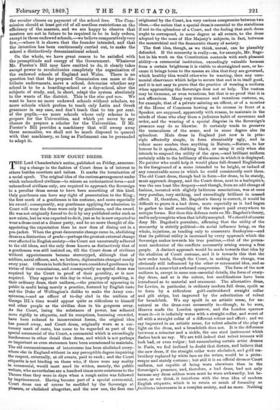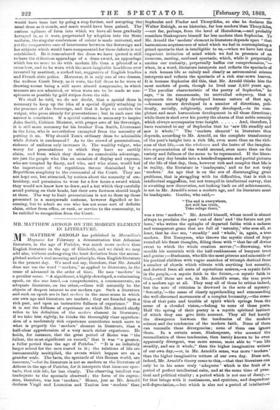THE NEW COURT DRESS.
THE Lord Chamberlain's notice, published on Friday, announcing a change in the fashion of Court dress is of interest to others besides courtiers and tailors. It marks the termination of a social epoch. The original idea of the curiousarrangement under
which unbeneficed civilians—to misuse an ecclesiastical term—and unbeneficed civilians only, are required to approach the Sovereign
in a peculiar dress seems to have been something of this kind. Only gentlemen can have any right of presentation to the King ; the first mark of a gentleman is his costume, and more especially his sword ; consequently, any gentleman applying for admission to Court will wear the dress worn only by gentlemen, and the sword. He was not originally forced to do it by any published order such as
now exists, but he was expected to do it, just as he is now expected to wear a dress-coat at a dinner party, and he no more thought of dis appointing the expectation than he now does of dining out in a pea-jacket. When the great democratic change came in, abolishing dress as a distinction of grade—perhaps the greatest external change ever effected in English society—the Court not unnaturally adhered to the old ideas, and the only dress known as distinctively that of a gentleman was still insisted on, till the Court dress of civilians without appointments became stereotyped, although that of soldiers, naval officers, and, we believe, diplomatists changed nearly every year. Officers in both Services were considered gentlemen by virtue of their commissions, and consequently no special dress was required by the Court in proof of their gentility, or is now required. They appear to this day in what, properly speaking, is their ordinary dress, their uniform,—the practice of appearing in public in mufti being merely a practice, fostered by English taste and the Duke of Wellington's dislike to make the Army con spicuous,-.and an officer of to-day clad in the uniform of George M.'s time would appear quite as ridiculous to himself and other people as the civilian does in his gorgeous array.
As the • Court, losing the substance of power, has adhered
more rigidly to etiquette, and its receptions, becoming crowded, have been reduced to inconvenient forms, the original idea has passed away, and Court dress, originally worn as a cus tomary mark of caste, has come to be regarded as part of the special ceremonial of the Court, a ceremonial which is exceedingly
burdensome in other detail than dress, and which is not perhaps
SO important as even statesmen have been accustomed to maintain. The old ceremoniousness of intercourse has been abolished every
where else in England without in any perceptible degree impairing the respect, externally, at all events, paid to rank ; and the Court etiquette is not binding on those who, if there were any reality
in ceremonial, would most need its withes, namely, the public writers, who nevertheless are a hundred times more courteous to the Throne than they were in days when a rough satire was followed by imprisonment. Having become part of a special ceremonial, Court dress can of course be modified by the Sovereign at Pleasure, or abolished altogether, and the new one, the first one originated by the Court, is a very curious compromise between two
ideas,—the notion that a special dress is essential to the stateliness if not to the splendour of a Court, and the feeling that such dress ought to correspond, in some degree at all events, to the dress adopted by the mass of Her Majesty's subjects, in fact, between the monarchical and the democratic theory of society.
The first idea, though, as we think, unreal, can be plausibly defended. If the monarchy is really—as, for example, Mr. Bagehot in his work on the Constitution contends with such pleasant ability—a ceremonial institution, exceedingly valuable because from a certain brightness it is visible to shortsighted men, or because it brings home to the masses an idea that they are governed, which healthy idea would otherwise be wanting, then any ceremonial observance which helps to secure that end is in itself good, and it is not easy to prove that the practice of wearing a uniform when approaching the Sovereign does not so help. The custom may be tiresome, or even vexatious, but that is no proof that it is not efficacious. Many very tiresome and vexatious customs, as, for example, that of a private saluting an officer, or of a member of the House of Commons bowing as he crosses in front of aSpeaker, are supposed, apparently with reason, to maintain in the minds of those who obey them a judicious habit of reverence and order, and the wearing of a special disguise in the Sovereign's presence may do so likewise. It certainly tends to preserve the unusualness of the scene, and in some degree also its splendour. Male dress in England just now is in principle affectedly simple, in form abominably ugly, and in colour more sombre than anything in Nature,—Nature, to her honour be it spoken, disliking black, or using it only when she intends to suspend the utility of the eyes,—and brilliant uniform certainly adds to the brilliancy of the scene in which it is displayed. No painter who could help it would place full-dressed Englishmen in the foreground of a scene intended to be bright, or indeed of any conceivable scene in which he could consistently omit them. The old Court dress, though bad in form—for dress, to be stately, must approach drapery, and the Court dress, next to a harlequin's, was the one least like drapery—and though, from an odd change of fashion, invested with slightly ludicrous associations, was at once very peculiar, very striking, and exceedingly brilliant in massed effect. If, therefore, Mr. Bagehot's theory is correct, it would be difficult to prove it a bad dress, more especially as it had begun to gather to itself something of the respect paid everywhere to antique forms. But then this defence rests on Mr. Bagehot's theory, and is onlycomplete when that is fully accepted. We should of course deny Mr. Bagehot's postulate, affirming that the utility of the monarchy is strictly political—its social influence being, on the whole, injurious, as tending only to consecrate flunkeyism—and that its political utility is increased by every approach which the Sovereign makes towards his true position,—that of the permanent moderator of the conflicts necessarily arising among a free people. A distinct approach would be made towards that idea by the abolition of Court costume, and it is towards this that the new order tends, though the Court, in making the change, was obviously still influenced by the other or ceremonial idea, and so invented a somewhat awkward compromise. The form of the new uniform is, except in some non-essential details, the form of everyday dress, and so is the colour, but modifications have been introduced as to material and ornament. The alternative drew, for Levees, in particular, is ordinary modern full dress, spoilt as to form by a ridiculous gold-embroidered straight collar and gilt stripe, but improved by the substitution of velvet for broadcloth. We say spoilt in an artistic sense, for un
natural as the dress-coat necessarily is—though, to be sure, Heaven made the London sparrow, and the London sparrow wears it—it is infinitely worse with a straight collar, and worst of all with a straight collar of a different colour and effect ; and we say improved in an artistic sense, for velvet admits of the play of
light on the dress, and a broadcloth does not. It is the difference
between a scimetar and a sickle, the one steel instrument which flashes back no ray. We are told indeed that velvet trousers will look bad, or even vulgar ; but remembering certain artist dresses
in Paris, we feel inclined to doubt that dictum, and believe that the new dress, if the straight collar were abolished, and gold em
broidery replaced by white lace on the wrists, would be a pictu
resque and stately costume ; but still it is an official dress or Court uniform, not capable of being worn elsewhere than in the Sovereign's presence, and, therefore, a bad dress, bad not only because any dress seldom worn must be worn awkwardly, but because, as we think, it interferes with the true idea of modern English etiquette, which is to retain so much of formality as facilitates intercourse in a complex society, and no more. Nothing
would have been lost by going a step farther, and accepting the usual dress as it stands, and much would have been gained. The curious ugliness of form into which we have all been gradually betrayed is, as it were, perpetuated by adoption into the State uniform, the singular sombrenesa of colour is made universal, and yet the comparative ease of intercourse between the Sovereign and her subjects which would have compensated for these defects is not established. Be it remembered the dress we have quoted is still to have the ridiculous appendage of a dress sword, an appendage which has no more to do with modern life than a pikestaff or a cross-bow, and to be worn with the most laughable headdress ever invented by martinet, a cocked hat, suggestive of English beadles and French civic police. Moreover, it is only one of two dresses, the undress Court livery, as it were, the full dress to be worn at drawing-rooms beiug a still more absurd compromise, in which trousers are not admitted, or when worn are to be made as conspicuous as possible by gold stripes down the side.
We shall be told, we do not doubt, that a special dress is necessary to keep up the idea of a special dignity attaching to the presence of the Sovereign, and that it helps to exclude the vulgar, who press already for presentations ; but in each case the answer is conclusive. If a special costume is necessary to inspire John Smith, Cabinet Minister, with proper awe of his Sovereign, it is still more necessary for his brother Toni Smith, Lieutenant in the Line, who is nevertheless exempted from the necessity of patting it on. Why should Tom's ordinary dress be admissible while John's is condemned ? As to the crowd of presentations, richness of uniform only increases it. The wealthy vulgar, who worry for presentations to which they have no earthly claim, and from which they derive no conceivable advantage, are just the people who like an occasion of display and expense, who are tempted by finery, and who, and who alone, would feel the importance of the republican throne diminished by a Republican simplicity in the ceremonial of the Court. They are not kept out, but attracted, by notices about the necessity of embroidery, and permission to wear for a few hours a sword which they would not know how to draw, and a hat which they carefully avoid putting on their heads, lest their own footmen should laugh at them. The way to limit presentations is not to dress up those presented in a masquerade costume, however dignified or becoming, but to admit no one who has not some sort of definite claim, either from office, or rank, or service to the community, to be entitled to recognition from the Court.



































 Previous page
Previous page